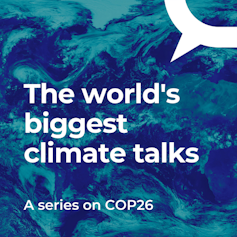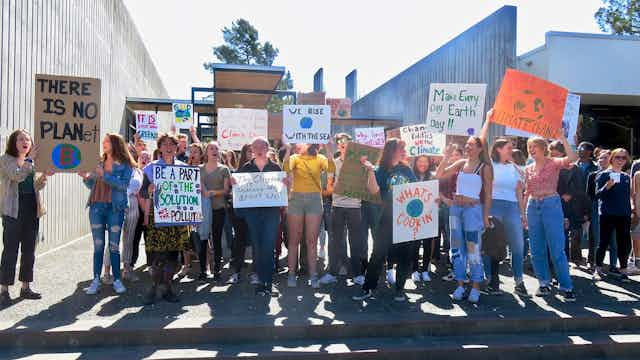At the UN climate change conference COP26, discussions are focusing on how young people and the public can be empowered to build a more sustainable world. Politicians attending the conference have highlighted the urgency of protecting the environment for the sake of our descendants.
During his opening remarks, US president Joe Biden asked an audience of fellow leaders: “Will we act? Will we do what is necessary?… or will we condemn future generations to suffer?”
Similarly, UK Prime Minister Boris Johnson argued that “young people around the world are already paying the price for the reckless actions of their elders” during Youth4Climate, a gathering of young people held before COP26.
“I saw protestors earlier on”, he added, “and frankly they have every right to be angry with those who aren’t doing enough to stop climate change.” These words from a world leader highlight the power of youth protest to put pressure on government negotiations.
Yet the lack of direct youth input into UN climate talks provides a reality check for statements like these. While deeply insightful, the speeches made by young delegates at COP26 are a poor substitute for participation in policymaking processes, from which youth around the world feel excluded.

Although young people across the world are working hard to raise the profile of climate change on government agendas, they still tend to be viewed as subjects rather than agents of change. This is disappointing, because my research has shown that increasing youth involvement in political decisions leads to more sustainable and effective public policy across a range of issues.
In London, for example, policies to address problems with policing and knife crime have become more successful since young, diverse voices were included in the Mayor’s Violence Reduction Unit, an expert body contributing to policymaking.
And my analysis of how young Londoners engage with the 17 UN Sustainable Development Goals has helped the city develop effective, practical solutions for addressing climate change in London, from introducing free bikes and reducing the cost of public transport to growing food in urban spaces.
Youth action
In recent years, young people’s lives have been continually reshaped by waves of crises. The 2008 financial crisis and recession, as well as the pandemic and climate emergency, have led to widespread concerns about the trajectory of youth futures.

This is reflected in the political priorities of younger generations. The results of a YouGov poll published on November 1 show that 43% of 18 to 24-year-olds in the UK believe that “the environment” is the most important issue facing the country. In comparison, 31% of over-65s and 35% of adults of all ages agreed.
Youth representation
These priorities are being translated into action. Young people were at the helm of many of the climate strikes that took place across the world in 2019. Although strikes were organised by a loose collection of campaigners, groups and platforms, a new generation of young leaders soon emerged at their forefront.
These included Greta Thunberg (Time magazine’s “Person of the Year” in 2019), Louise Neubauer (organiser of the German climate strike movement), and Leah Namugerwa (known for championing tree planting and banning plastic bags in Uganda). Unusually for a youth-led social movement, much of this momentum was translated into policy changes, including a flurry of new targets for reducing carbon emissions.
The growing acceptance of a climate emergency has also empowered young, radical political representatives to make their voices heard, such as US congresswoman Alexandra Ocasio-Cortez. Her push to establish a Green New Deal in the US – a sweeping set of policies aimed at addressing climate change – has directly influenced the environmental priorities of the Biden administration, which this year announced a climate-focused infrastructure improvement plan for the country worth around £1.5 trillion.
In other countries, electoral support for environmental parties has also increased in tandem with youth climate advocacy. The German Green Party, for example, became the most popular party among those aged under 30 in both the 2019 European parliament election and 2021 federal election. It even gained sufficient support in 2021 to enter the coalition government in Berlin: proving that youth voices can directly influence the direction of government policy.
Irrespective of COP26’s youth representation, young people continue to reshape environmental policy from the ground up – a process that we can help speed by inviting more youth into the rooms where climate decisions are made.

This story is part of The Conversation’s coverage on COP26, the Glasgow climate conference, by experts from around the world.
Amid a rising tide of climate news and stories, The Conversation is here to clear the air and make sure you get information you can trust. More.

